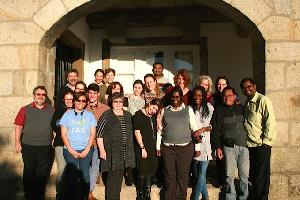A capacity building workshop for trainers of theLearning to Live Together Programmewas held in Ponte de Lima, Portugal from 4 – 9 March 2014.The meeting aimed to learn from one another’s experiences, strengthen capacity to implement training programs, monitor and evaluate their impact, and to co-create specific resources related to training facilitators.

The workshop was open with the poem of Ithaca by Constantine P. Cavafy that invited the participants on a journey of reflection and discovery. The meeting was designed as a journey to weave stories of change together, to weave reflections and experiences and jointly discuss the key aspects of the ethics educational framework. Following a morning reflection exercise to get to know each other, participants shared their training experiences in their different contexts. They did not only share the successful stories, but also the challenges and difficulties they have encountered and on how to tackle those.
On the second and third day of the workshop, participants discussed and further explored some of the concepts that form the educational framework of the Learning to Live Together Programme: ethics, spirituality, religion, ethics education and interfaith learning. It was noted that some of the concepts are challenging to deal with depending on the context where the trainer or facilitator works. The Learning to Live Together Programme does not provide fixed answers or definite definitions, on the contrary it provides spaces to reflect on our own understanding of those concepts and to critically think on the implications it has in our own contexts.
The following days, the educational approach was discussed and unpacked and participants teamed up in groups to discuss its key areas and how those can be integrated more systematically and purposely into training programs. Participants provided recommendations and discussed guidelines to design training programs at different levels and reflected on the several challenges and opportunities to create safe learning environments and ensure participatory, inclusive and context-sensitive programming. A session on constructivism and behaviourism approches also helped participants to reflect and discuss the Learning to Live Together educational approach and particularly the importance of constructivism in the work we do with facilitators and children.
Furthermore, a substantial amount of time was devoted to the enhancement of key facilitation skills through group activities. A presentation of monitoring and evaluation processes was made to introduce the participants to the differences between monitoring and evaluation. Participants discussed and recommended different ways to monitor and evaluate training programs and implementation with adults, children and youth. The concept of communities of practice and the upcoming e-learning platform for facilitators was also introduced and participants discussed ways to use the communities of practice for follow up processes and to ensure continuity of their training programs.
At the end of the workshop participants discussed concrete action plans in particular the development of training programs for facilitators, ways to ensure ongoing support, follow up and systematic implementation. The participants coming from Ecuador, El Salvador, Greece, India, Portugal, Romania, South Africa, Sri Lanka and United States/Japan will be working during the next months with the support of the Geneva office in the development of systematic programs that can support the introduction of communities of practice in their locations and follow up processes. The recommendations and guidelines discussed during the meeting will provide the basis for the developmen of a training guide to support trainers in the development of more systematic and quality-based programs.
Thanks goes to all the participants for their interest, committment and enriching discussions and to all volunteers and interpreters for their valuable work. Special thanks goes to the Interfaith Council members who were present: Agneta Ucko, Angelos Vallianatos, Hans Ucko and Jane Rechtman for their unwavering support and contributions before and during the workshop.